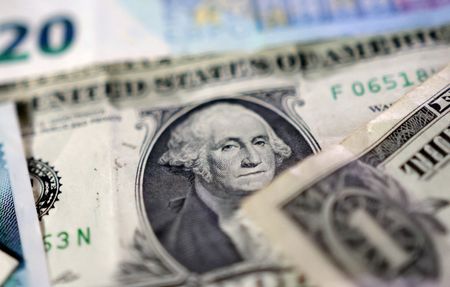By Ahmad Ghaddar
LONDON (Reuters) -Oil prices steadied on Wednesday, as signs of stronger Chinese crude consumption were outweighed by investor caution about the wider economic impact from U.S. tariffs.
Prices have seesawed in a tight range, as signs of steady demand from an increase in travel during the Northern Hemisphere summer have competed with concerns that U.S. tariffs on trading partners will slow economic growth and fuel consumption.
Brent crude futures eased 17 cents, or 0.3%, to $68.54 a barrel by 0844 GMT. U.S. West Texas Intermediate crude futures were down 11 cents, or 0.2%, to $66.41.
U.S. President Donald Trump has threatened a 30% tariff on imports from the European Union from August 1, a level European officials say is unacceptable and would end normal trade between two of the world’s largest markets.
The European Commission is preparing to target 72 billion euros ($84.1 billion) worth of U.S. goods for possible tariffs if talks with Washington to reach a trade agreement fail.
Trump on Monday also said that the United States will impose “very severe tariffs” on Russia in 50 days if there is no deal to stop the war in Ukraine.
“The latest U.S. salvo towards Russia failed to reignite fears of sustained supply disruption, and as a result, oil continued to drift lower yesterday,” PVM oil analyst Tamas Varga said in a note.
An improved demand outlook from China limited losses, however.
Chinese state-owned refiners are ramping up production after completing maintenance to meet higher third-quarter fuel demand and to rebuild diesel and gasoline stocks which are at multi-year lows, traders and analysts said.
Meanwhile, OPEC’s monthly report on Tuesday forecast that the global economy would do better in the second half of the year, boosting the oil demand outlook.
Brazil, China and India are exceeding expectations while the U.S. and EU are recovering from last year, it added.
U.S. crude, distillate and gasoline stocks rose last week, market sources said, citing American Petroleum Institute figures on Tuesday.
Crude stocks rose by 839,000 barrels in the week ended July 11, the sources said. Gasoline inventories rose by 1.93 million barrels and distillate stocks rose by 828,000 barrels, they added.
(Additonal reporting by Colleen Howe and Trixie Yapp; Editing by Sharon Singleton)









